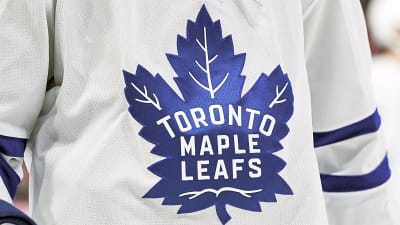As Penn State goaltender Arsenii Sergeev bear-hugged his coach, Joe Battista did the same with his wife. In their South Carolina living room, watching the Nittany Lions celebrate a Frozen Four bid, Joe and Heidi Battista cheered and cried as they flickered through Penn State's hockey history.
How the program, which played its first game in 1909, was cut twice from the university budget; how it re-started in the 1970s with a chemistry professor as head coach; how Joe he met Heidi playing hockey for Penn State; how Battista coached the Icers club team to six national titles; and how a Penn State graduate who owned a gas-drilling business and loved the sport once asked him, "What will it take?" to make the Nittany Lions a power in NCAA Division I hockey.
It was a lot. So when Matt DiMarsico scored the overtime goal that lifted the Nittany Lions over UConn and into their first Frozen Four, Battista let loose.
"All the emotion came out. I don't know that I was expecting that, quite frankly," Battista said in an interview from his South Carolina home, which is decorated with Penn State hockey memorabilia. "The euphoria, it was natural. The thing that makes me the happiest is all the joy that this brought to so many people."
Penn State will face Boston University in the NCAA semifinals Thursday in St. Louis, making its first Frozen Four appearance in its 13th season as a varsity program. But really, Penn State hockey is a 115-year tale often unable to start its next chapter.
And fittingly, Penn State will make its Frozen Four debut against BU, a hockey program that holds a unique place in the program's formation. Fifteen years ago, Battista was crossing a street outside BU's Agganis Arena when he received a text from Terry Pegula: "Just signed agreement. Great day for hockey in Happy Valley!" In that moment, Penn State's hockey future began.
"The current players may not understand that yet," Battista said. "They went out and won a hockey game, and that's special for them. That bond will last forever for them. But the influence, the impact that it had on a much greater scale, is something they won't understand for years."
The origins of Penn State hockey
Before that 2010 text, Penn State had a challenging relationship with hockey. The team played its first game in December 1909 in Pittsburgh, but a month later the university declined to fund the sport, leaving students to lobby its return for nearly three decades. In 1938, a Penn State fraternity formed an independent club team, played a few games and eventually received a $100 university budget.
Penn State had a hockey team, which played for several seasons until the university suspended the program during World War II. The team never recovered post-war, though, and the university dropped the sport again in 1947. More than two decades later, another group of students led by Roy Scott began petitioning Penn State to revive hockey. Three thousand signatures later, the Icers were born.
The Penn State Icers, a club team, debuted in 1971, coached by chemistry professor Larry Hendry. Battista played for the Icers in the early 1980s. He was a nuclear engineering major who loved hockey and met a woman who sold ads for team programs. He and Heidi would walk under a line of hockey sticks at their wedding.
Battista became Penn State's hockey coach in 1987, leading the Icers to six ACHA national titles and 512 wins. But during his 19 years as head coach, Battista wanted to bring Penn State into Division I. He knew that would require a new arena and a major donor, neither of which Penn State had. Until November 2005, when Pegula called.
Joe and Heidi were sitting down to dinner as their phone rang. It was Pegula, a Penn State alumnus who owned a gas-drilling company, and he wanted to talk hockey at his alma mater. Pegula and wife Kim had brought their son to hockey camps at Penn State and were curious about something.
"Minnesota, Michigan, Boston University — he said Boston University — why are we not playing these teams?" Battista recalled Pegula asking.
Battista responded with the standard reasons — arena, scholarships, funding, Title IX — preventing Penn State from upgrading its program. "I'm in town," Pegula said. "Meet me at Kelly's [a popular nearby restaurant], and I'll buy you dinner."
Pegula wasted no time at dinner. "What will it take?" he asked. Battista had a number but was unsure how Pegula would react. "Fifty million dollars," Battista said.
Pegula leaned back in his chair and put his hand on his chin. "OK," he said. "I can help you with that."
Penn State's own 'Miracle on Ice'
The path from steak dinner to Pegula Ice Arena didn't follow a straight line. Pegula wouldn't make his initial $88 million gift, the largest in Penn State history, until 2010, when he sold assets of his company East Resources for $4.7 billion. That summer Battista, Pegula and others from Penn State toured college hockey arenas, scouting ideas for what they would build in State College.
In August 2010, Battista was in Boston visiting with BU alum Mike Eruzione, who famously scored the United States' game-winning goal over the Soviet Union in the 1980 Winter Olympics. Battista watched that game as a Penn State student. It made him cry and reconsider hockey as a career path over nuclear engineering.
"I shook hands with Eruzione and told him that I was hoping for our own 'Miracle on Ice,'" Battista said.
Just minutes later, as he crossed Commonwealth Avenue outside Agganis Arena, Battista's phone buzzed with the text from Pegula. Agreement signed, great day for hockey.
"I'm literally standing in the middle of Commonwealth Avenue, bawling like a baby," said Battista, who became an associate athletic director in 2010. "It was overwhelming. So it's one of the great ironies that we're going to play one of the most storied programs in college hockey in our first ever Frozen Four. That's so cool, right?"
Penn State broke bround on Pegula Ice Arena in February 2012, and later that year the men and women's varsity programs debuted in NCAA play. Pegula Ice Arena opened in 2013, after Terry and Kim Pegula had supplemented their gift with an additional $14 million, bringing the total to $102 million.
"This started with Terry and Kim, their love of Penn State and their love of hockey," Battista said. "They wanted the program to go from success to significance."
After Penn State won the NCAA Allentown Regional final in late March, coach Guy Gadowsky celebrated on the ice with current and former players. He couldn't help but reflect on the lift that Pegula, Battista and so many others had conducted to produce that moment.
"[Pegula] was very forthcoming immediately, saying, 'My dream would be to have hockey players grow up in Pennsylvania, play for Penn State and then go on and play in the NHL,'" Gadowsky said. "That was his vision. And that's something that, when you hear it, you automatically want be a part of that, if you can be. And Joe obviously was a part of everything that this program did and certainly echoed and reinforced that vision."
Though he is retired, Battista remains busy as an author (he wrote "The Power of Pragmatic Passion"), speaker and coach with Fellowship of Christian Athletes. And Penn State hockey lives in his blood. He played adult hockey at Pegula Ice Arena until he was 61, hanging up his skates after scoring a goal on his final shift.
"The dream came true," Battista said. "I feel blessed, becaue I got to be the band leader of both the Icer family and 'Team Pegula.' I could not be happier for the people running the program now. On behalf of those from the past, kudos all around for making this happen. Hopefully this is the first Frozen Four of many more."
More must-reads:
- Ducks sign starting goaltender to a new five-year deal
- Insider shares major LeBron James retirement update
- The 'MLB All-Star Game MVPs' quiz
Breaking News
Trending News
Customize Your Newsletter
 +
+
Get the latest news and rumors, customized to your favorite sports and teams. Emailed daily. Always free!








